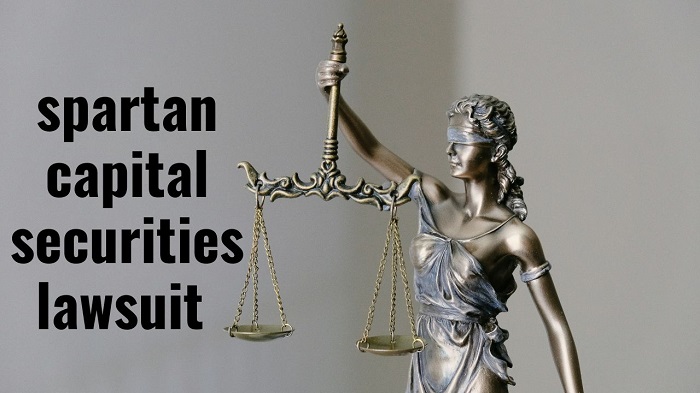Emerging as a major court fight illuminating important claims of financial industry regulatory violations and illegal activity is the spartan capital securities lawsuit. This article emphasizes the need for compliance and moral conduct. It also reminds us of the consequences that follow when these criteria are undermined.
What is Spartan Capital Securities?
Offering a wide range of financial services, including investment advising, trading, and wealth management, Spartan Capital Securities is a brokerage company. Moreover, starting with the intention of offering customized financial solutions, Spartan Capital has become well-known in the cutthroat financial services sector. Though at first promising, the company has come under several accusations and regulatory investigation over its business methods.
Details of the Spartan Capital Securities Lawsuit
The Spartan Capital Securities case mostly revolves around claims of gross negligence in the supervision of its brokers. It also deals with illegal trading, and misleading activities. Many investors have suffered significant financial losses as they claimed that the firm’s brokers participated in unethical but even unlawful practices.
Allegations and Regulatory Exchanges
So, the main accusations directed against spartan capital securities lawsuit consist in:
- Brokers have been accused of giving misleading or inaccurate information regarding investment products, therefore guiding customers to make bad financial choices.
- Unauthorized trading—a blatant breach of fiduciary responsibilities—has been documented several times of brokers making transactions without getting express permission from the customers.
- Allegedly, the company neglected to put in place sufficient supervising systems to monitor the activity of its brokers, leading to several illegal and maybe fraudulent behaviors.
Regulatory agencies including the Financial Industry Regulatory Authority (FINRA) have been quite interested in the matter and started thorough investigations to find the degree of the infractions. Moreover, these probes have shown structural problems with Spartan Capital Securities, including inadequate internal controls and non-regulatory standards adherence breakdown.
Effect on Customers
For its customers, the Spartan Capital Securities case has had dire consequences. Many investors have claimed large financial losses; others have lost their whole investment portfolios because of broker fraud. Further, these customers have suffered significant emotional and financial costs, which has prompted demands for more responsibility and pay.
Fines and sanctions
Further, through investigations Spartan Capital Securities to pay several fines and penalties. These cover misbehavior and discourage future infractions. Moreover, these fines have included strict criteria to revamp the firm’s compliance and supervising systems, financial penalties, and obligatory reimbursement to impacted customers.
The Legal and Regulatory Scene
The lawsuit against Spartan Capital Securities is not an isolated occurrence but rather a result of a larger trend of more financial services industry regulatory scrutiny. Moreover, growing awareness of the need to protect investors from dishonest and unethical behavior drives this increased alertness.
Regulatory bodies engaged in the
Overseeing the operations of brokerage companies and guaranteeing adherence to financial rules and regulations depend critically on many regulatory agencies. among these are:
- FINRA: Comprising the main self-regulating body for American brokerage companies, FINRA constantly checks and investigates to guarantee companies follow industry norms.
- SEC: Enforcing federal securities laws and controlling the securities market to safeguard investors and preserve fair and efficient markets falls to the Securities and Exchange Commission, or SEC.
- State Regulatory Agencies: Individual states also have their own agencies in charge of supervising financial company activities within their borders.
Value of Compliance and Monitoring
The spartan capital securities lawsuit emphasizes the vital need of strong compliance and supervising systems within financial companies. Good supervision guarantees that brokers behave in customers’ best interests in addition to helping to stop dishonest behavior. Further, important components of a competent compliance system consist in:
- Frequent ethical behaviour and regulatory necessity training courses for brokers
- Regular audits conducted within the company help to find and fix any compliance concerns.
- Well defined rules that clearly state the expectations of the company and the penalties of non-compliance will help to shape behavior.
- Modern monitoring instruments allow one to follow broker activity and identify any anomalies right away.
The Function of Those Whistleblowers
Finding fraudulent behavior in financial companies usually depends on whistleblowers, who are quite important. Also, their openness to provide information may inspire inquiries and result in major legislative action.
Legal Safeguards for Those Whistleblowers
Many laws provide those who disclose misbehaviour protection rewards in order to promote whistleblowing. These consist in:
- The Dodd-Frank Act gives whistleblowers who offer information guiding successful enforcement actions large cash incentives.
- Protections against reprisals for workers who disclose corporate malfeasance come from the Sarbanes-Oxley Act.
Many well-publicized incidents of financial misbehaviour have been made public thanks to whistleblower activities. Further, their efforts are priceless in preserving investor protection and financial markets’ integrity.
Lessons Acquired and the Aftermath
The litigation involving spartan capital securities lawsuit has taught the banking sector some very significant lessons. Moreover, important lessons consist of the need for:
- Constant enhancement of regulatory systems helps to identify and stop misbehaviour.
- Investing in strong compliance initiatives will help to guarantee adherence to moral and legal norms.
- Maintaining confidence in the financial system depends on making companies and people accountable for their activities.
Conclusion
The continuous spartan capital securities lawsuit litigation reminds us sharply of the possible consequences of financial sector negligence of ethical and regulatory obligations. To maintain integrity and confidence in the financial markets, it emphasizes the need of openness, appropriate control, and following legal criteria.
FAQs
What main claims are made in the Spartan Capital Securities lawsuit?
The major claims include deception, illegal trading, and insufficiently supervised broker behaviour.
Who is looking at the accusations levelled against Spartan Capital Securities?
The company is under inquiry by the Financial Industry Regulatory Authority (FINRA) and other agencies.
What may the outcomes be for Spartan Capital Securities?
To guarantee regulatory compliance, the company must pay fines, penalties, and maybe adjust its operating practices.
How may investors guard against such problems?
Researching brokerage companies, routinely checking investment accounts, and being alert about illegal activities may help investors safeguard themselves.
How may financial companies avoid such lawsuits?
Strong compliance processes, guaranteed broker effective monitoring, and a company culture stressing ethical conduct and openness may all be implemented by financial companies.










Got a Questions?
Find us on Socials or Contact us and we’ll get back to you as soon as possible.